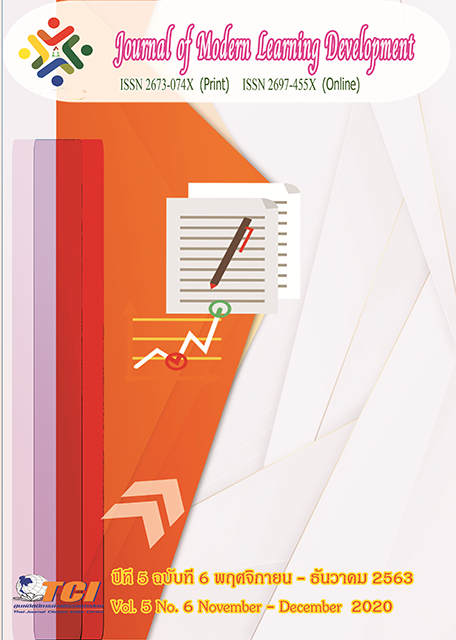Development of Microsoft Teams-Based Learning Model for Introduction to Political Science
Main Article Content
Abstract
The objectives of the research were (1) to develop the Microsoft Teams-based learning model for the subject “Introduction to Political Science,” (2) to study the students’ learning achievement from the model, and (3) to study the students’ satisfaction with the model. The target group was a total of thirty-two first-year students of Mahamakut Buddhist University, Srilanchang Campus, majoring in Government and studying Introduction to Political Science in the first semester of the academic year 2563. The instruments used for data collection comprised of (1) Thai Qualifications Framework for Higher Education (TQF) 3 for Introduction to Political Science, (2) Assessment for Microsoft Teams-based Learning Model for Introduction to Political Science, (3) Content Assessment for Microsoft Teams-based Learning Model for Introduction to Political Science, (4) Online Classroom Assessment for Microsoft Teams-based Learning Model for Introduction to Political Science, and (5) Student Satisfaction Survey on Microsoft Teams-based Learning Model for Introduction to Political Science. The statistics used for data analysis composed of percentage, arithmetic mean, standard deviation, and the t-test for dependent samples.
The findings of the research were as follows: (1) The developed model was found efficient for learning. The opinion of the experts on the model was found to be overall at a high level ( = 4.37). Their opinion on the model’s content was found to be overall at a high level ( = 4.44); their opinion on the model’s online classroom was found to be overall at a high level ( = 4.44). (2) The learning achievement of the students from the model was found to be higher and the students’ posttest was found to be higher from their pretest at a statistically significant level of 0.01. (3) The students’ satisfaction with the model was found to be overall at a high level ( = 3.50).
Article Details
References
บุญเชิด ภิญโญอนันต์พงษ์. (2527). การวัดผลและประเมินผลการศึกษา: ทฤษฎีและการประยุกต์ กรุงเทพมหานคร : คณะศึกษาศาสตร์ มหาวิทยาลัยศรีนครินทรวิโรฒ ประสานมิตร
นิลุบล ทองชัย. (2556). การประยุกต์ใช้สื่อการเรียนออนไลน์เพื่อเพิ่มผลสัมฤทธิ์ในการเรียนรายวิชา ภาษาอังกฤษสำหรับวิทยาการคอมพิวเตอร์ของนักศึกษามหาวิทยาลัยราชภัฏกาญจนบุรี สาขาวิทยาการคอมพิวเตอร์ คณะวิทยาศาสตร์และเทคโนโลยี. บทความเพื่อนำเสนอในงานประชุมวิชาการ NCCIT.
ยอดนภา เกษเมือง. (2554). การพัฒนาระบบการเรียนการสอนบนเว็บไซต์เพื่อเพิ่มผลสัมฤทธิ์ทางการเรียนของนักศึกษาสาขาวิศวกรรมอุตสาหการ. วิทยานิพนธ์. บัณฑิตวิทยาลัย: มหาวิทยาลัยเทคโนโลยีราชมงคลธัญบุรี.
สรพงศ์ สุขเกษม. (2559). การพัฒนารูปแบบการเรียนการสอนแบบผสมผสานรายวิชา คอมพิวเตอร์สารสนเทศ ขั้นพื้นฐานสำหรับนิสิตระดับปริญญาตรี. วิทยานิพนธ์ปริญญาดุษฎีบัณฑิต สาขาวิชาเทคโนโลยีและ สื่อสารการศึกษา. บัณฑิตวิทยาลัย: มหาวิทยาลัยนเรศวร.
สุรพล บุญลือ. (2550). การพัฒนารูปแบบการสอนโดยใช้ห้องเรียนเสมือนจริงแบบใช้ปัญหาเป็นหลักในระดับอุดมศึกษา. วิทยานิพนธ์ปริญญาการศึกษาดุษฏีบัณฑิต สาขาวิชาเทคโนโลยีการศึกษา. บัณฑิตวิทยาลัย: มหาวิทยาลัยศรีนครินทรวิโรฒ.
อัญชลี บุญฤทธิ์. (2554). การศึกษาผลสัมฤทธิ์ทางการเรียนของผู้เรียนโดยใช้ห้องเรียนเสมือนจริง. วิทยานิพนธ์ปริญญาครุศาสตร์อุตสาหกรรมมหาบัณฑิต. สาขาวิชาคอมพิวเตอร์และเทคโนโลยีสารสนเทศ. คณะครุศาสตร์อุตสาหกรรมและเทคโนโลยี: มหาวิทยาลัยเทคโนโลยีพระจอมเกล้าธนบุรี
worathan technology. (2020). การเรียนการสอนออนไลน์ คือ?. ออนไลน์. สืบค้นเมื่อ 30 กรกฎาคม 2563 แหล่งที่มา https://www.worathan.co.th/รายละเอียด/5dce36b35005500012ea9c 6b/การเรียนการสอนออนไลน์คือ/5e71a1cb92d8170012f4593e
Covid-19 Coronavirus Pandemic. (2020). Covid-19. Online. Retrieved July 30, 2020. from : https://Www. Worldometers.Info/Coronavirus/


